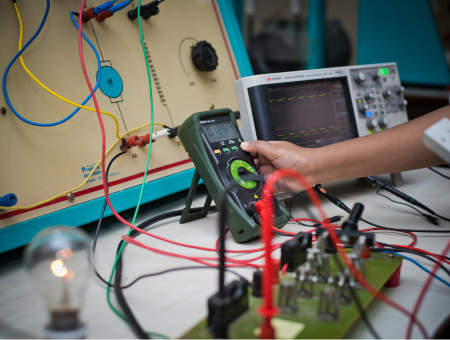The demand for BTech Electronics and Communication professionals is increasing, which is fulfilled by technological advancements and the growing need for skilled individuals in telecommunications, electronics manufacturing, IT, and research. Graduates with expertise in this field are sought after for their ability to innovate and solve complex challenges.
Now, we are living in an era of technological interconnectedness and innovation. Electronics and communication engineering ( ECE) shapes the modern world. Pursuing a B.Tech degree in Electronics and Communication paves the way for a fulfilling career on the cutting edge of technological progress. This write-up delves into the many aspects of BTech Electronics and Communication, exploring its importance, syllabus, career prospects, and impact on society.
Importance of B.Tech in Electronics and Communication Engineering
BTech Electronics and Communication is the centre of many disciplines, encompassing electronics, telecommunications, signal processing, and networking. This interdisciplinary field drives innovation across diverse sectors, including telecommunications, information technology, healthcare, automotive, and aerospace. From developing cutting-edge communication systems to designing next-generation electronic devices, graduates of B.Tech in Electronics and Communication are equipped with the abilities and understanding to handle the growing needs of today’s digital world.
Syllabus of BTech ECE
The BTech Electronics and Communication curriculum is designed to provide students with a comprehensive understanding of the field’s core principles, theories, and applications. Key subjects covered include:
- Electronic Devices and Circuits: Semiconductor physics, transistor circuits, and integrated circuit design.
- Analog and Digital Electronics: Operational amplifiers, digital logic circuits, and microprocessor systems.
- Signals and Systems: Signal analysis, Fourier transforms, and system modelling.
- Communication Systems: Modulation techniques, digital and wireless communication.
- Electromagnetic Theory: Maxwell’s equations, transmission lines, and electromagnetic wave propagation.
- Digital Signal Processing: Signal processing algorithms, filtering techniques, and speech processing.
- Networking and Data Communication: Network protocols, data transmission, and computer networks.
- Embedded Systems: Microcontroller programming, real-time systems, and embedded software development.
The curriculum emphasizes hands-on learning through laboratory experiments, projects, and industry internships, allowing students to apply theoretical concepts to real-world problems and gain practical experience in designing, implementing, and testing electronic and communication systems.
BTech Electronics and Communication Scope
Graduates with a B.Tech in electronics and communication are in high demand across various industries, owing to their versatile skill set and expertise in cutting-edge technologies. BTech Electronics and Communication scope and career opportunities abound in telecommunications companies, IT firms, electronics manufacturing companies, research institutions, and government organizations. Roles may include:
- Telecommunication Engineer: Designing, implementing, and maintaining communication networks, including wired and wireless.
- Electronics Design Engineer: Developing electronic circuits, systems, and devices for consumer electronics, medical devices, and industrial applications.
- Signal Processing Engineer: Designing algorithms and software for processing and analyzing signals in applications such as image processing, audio processing, and telecommunications.
- Embedded Systems Engineer: Design and program embedded systems for automotive, aerospace, consumer electronics, and IoT applications.
- Network Engineer: Configuring, managing, and troubleshooting computer networks, including LANs, WANs, and wireless networks.
- Research Scientist: Conducting research and development in wireless communications, semiconductor devices, and signal processing.
Impact on Society:
BTech Electronics and Communication profoundly impacts society, driving innovation, economic growth, and societal progress. Advances in telecommunications have facilitated global connectivity, enabling instant communication and information exchange across borders. Electronic devices and systems have revolutionized healthcare, transportation, entertainment, and education, enhancing quality of life and expanding opportunities for people worldwide. Additionally, emerging technologies such as IoT, AI, and 5G hold the potential to further transform industries and address pressing societal challenges.
Conclusion:
BTech Electronics and Communication is a gateway to a gratifying career at the intersection of technology, innovation, and societal impact. Through a comprehensive curriculum, hands-on learning experiences, and diverse career opportunities, graduates holding a B.Tech in Electronics and Communication are well-positioned to influence the direction of technology and enact beneficial changes on a global scale. As we continue to navigate the digital age, the importance of B.Tech in Electronics and Communication in bridging the digital divide and advancing human progress cannot be overstated.


